Pride and prejudice in the Netherlands Indies
Peter Breedveld
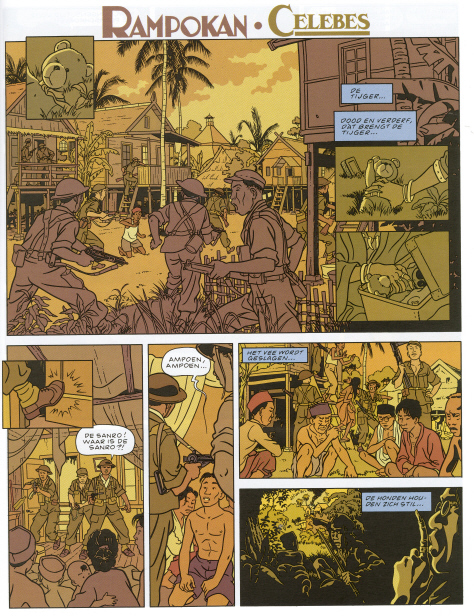
Six years ago Rampokan: Java was published, the first part of Peter van Dongen’s graphic novel set in the Netherlands Indies, now known as Indonesia. The story takes place at the eve of the so-called Police Actions (a euphemism for the full-blown colonial war between the Dutch and Indonesian nationalists that took place in 1947 and 1948) and with it Van Dongens solid reputation as a serious graphic novelist was established. Recently the second and last part at long last appeared: Rampokan: Celebes.
On august 16, 1945, one day after the capitulation of Japan to the allied forces, graphic novelist Peter van Dongen’s grandfather was beheaded by the Japanese. “He was an officer in the Royal Netherlands-Indies Army (KNIL)”, Van Dongen says. “He was an Indo-European, stationed in Menado, in what is now known as North Sulawesi, and he stood firmly for Queen, country and the Dutch tricolour. The Japanese told him to give up his arms, and then he would be left in peace. Out of loyalty he refused. That’s why he was beheaded.”
As a child Van Dongen was told that his grandfather had given his life in the war, but he didn’t know the details. “My grandmother couldn’t talk about that. She would immediately start to cry. So you stop asking questions. You don’t want to see your grandmother cry. But at one time she did tell us everything.”
Ever since the tragedy never left his thoughts for long. “You can’t help thinking: ‘If only the Japanese capitulation had come one day sooner, he might still have lived.”
There is a beheading in Celebes, the long expected sequel to Van Dongen’s Netherlands-Indies epic Rampokan: Java. It’s directly related to his grandfather’s beheading, Van Dongen says. “I try to give these things a place in my story.”
Terrorists
Rampokan takes place at the eve of the Police Actions, the colonial war that the Dutch undertook against the Indonesian freedom fighters, right after the Second World War. Partly because of that, the beheading reminds the reader of the recent beheadings of hostages in Iraq. Absolutely coincidental, according to Van Dongen. The script for Celebes had been written four years ago already.
It is still striking, just like the scene in which an Indonesian freedom fighter is physically abused by Dutch soldiers. ‘Beating of terrorists is allowed’, one of them says. As if Van Dongen is commenting on the mistreatment of Iraqi prisoners in the Abu Ghraib prison.
“I don’t want to pretend I have the gift of foresight”, Van Dongen reacts, “but the Ameriican misconception that the terrorists form only a small part of the Iraqi population, that the people of Iraq supports the Americans, thát too is in my book! That is exactly the kind of talk Dutch officers gave to their subordinates. Until they found out it wasn’t just a small group of terrorists, that the entire populations saw them as occupiers too.”
Misunderstandings and prejudice, Rampokan is ridden with it. The main protagonist is a Dutch soldier who is on the search for his former nanny, and for the Dutch Indies from his childhood, which no longer exists. He is not who he seems to be himself. The relationships between the different ethnic groups in the Dutch colony are all disturbed by prejudice. The Dutch discriminate against the Indonesians, Indonesians discriminate against the Chinese.
Vam Dongen, who is of mixed, Indo-European race, was often called names when he was a child. Other children called him ‘peanut’, or ‘poop-Chinese’. It didn’t bother him. Only when a group of South Moluccan radicals (The Moluccans form a group of islands in the Indonesian peninsula) hijacked a train in Holland in the seventies the name-calling started to leave marks. “I was called a ‘dirty Moluccan’ and stuff like that. I thought: ‘So that’s how you see me. Apparently I don’t really belong to these blonde kids I always played with before’.”
Van Dongen experienced what racism is. But it’s not the reason racism plays such an important role in Rampokan. “Netherlands Indies society was firmly based on race and class. So if I make a graphic novel about that particular period and place, of course it is a factor.”
But although the story is often painfully realistic, the art in Rampokan drips with nostalgia. With his clear style of drawing, Van Dongen creates an Idyllic portrait of the Netherlands Indies. “These are the Netherlands Indies I have never known”, he says. “It’s the image I have formed on the basis of old photographs and books. All from a Dutch perspective, of course. Sodden with feelings of nostalgia about the world that we have lost. That’s how Indo-European people look at it. That’s what you hear them often say: that they don’t have a mother country that they can return to. They can go back, of course, but only as tourists, even though they were born there.”
History book
Besides, Van Dongen emphasises, he never intended to make a history book. “I don’t feel the need to play the know-it-all history teacher. In the end it all comes down to the characters and not to the historic background. I am interested in people and how they deal with specific situations. Only now and then something of the historic context plays an important role.”
Van Dongen was often told that Rampokan was too much about a certain chapter in Dutch and Indonesian history. That people from outside Holland or Indonesia would never be interested in his book. Meanwhile, however, the first part of Rampokan was brought out in France, where it was modestly succesful. This month Van Dongens work is shown at an exhibition about colonialism in Charleroi (in France) and an Italian publisher has shown interest. “Of course”, Van Dongens says triumphantly. “France and Italy have been involved in colonial wars as well. I have spoken to French veterans of the war in Algeria. They really approve of me telling this story. French reviewers of my book wrote that the setting of Rampokan reminds them of French Indo-China and the horrors of Algeria. So what are these people bullshitting about, telling me Rampokan is only of interest to the Dutch market?”
The renowned Dutch publisher De Bezige Bij has approached Van Dongen asking him to make a graphic novel of the literary classic Max Havelaar, 19th century writer Multatuli’s charge against the Dutch treatment of the indiginous people of the Netherlands Indies. “In reply I proposed to do something with Louis Couperus’ De Stille Kracht, also set in the Dutch colony. I have to think about it. My next graphic novel might be about characters from Rampokan. It will be about the Netherlands Indies again, for sure. That’s what keeps fascinating me.”
English, Peter Breedveld, strips, 18.02.2005 @ 14:41

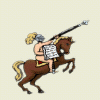
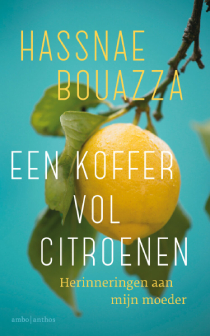
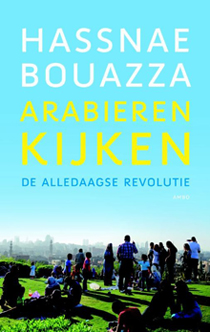
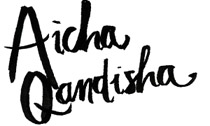

 RSS
RSS